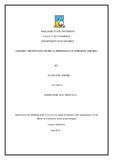Please use this identifier to cite or link to this item:
https://cris.library.msu.ac.zw//handle/11408/3894| Title: | Assessing the dynamics of fiscal performance in Zimbabwe (1990-2018) | Authors: | Nyabunze, Admire | Keywords: | dynamics of fiscal performance | Issue Date: | Jun-2019 | Publisher: | Midlands State University | Abstract: | The thesis examines the dynamics of fiscal performance in the Zimbabwean economy. The study used annual time series data starting from the year 1990 up to 2018 to establish the economic factors contributing to budget deficits. During the period under review, Zimbabwe has experienced perpetual budget deficits except during the years 2009, 2010 and 2011 were budget surpluses were chronicled. The fiscal imbalance that has characterised the economic landscape of Zimbabwe has had negative pass through effects to the broader economy at large. The variable budget deficit was used as the depended variable whilst the explanatory variables used in the study are unemployment, gross domestic product, gross fixed capital formation, foreign debt and real interest rates. The lagged value of the budget deficit was also included amongst the independent variables. Using the robust Ordinary Least Squares regression methodology, the empirical results indicated that unemployment and gross domestic product are significant in explaining budget deficits in Zimbabwe. The lagged value of the budget deficit was also found to be significant in determining budget deficits in Zimbabwe. The variable unemployment was found to be positively related to budget deficits meaning that an increase in unemployment is associated with an increase in the fiscal deficit. The GDP variable was found to be inversely related to budget deficits meaning that an increase in the GDP level helps in reducing the size of the budget deficit. The lagged value of the budget deficit was found to be positively related to budget deficits in the current period. This means that if the government runs a fiscal deficit in the current year, the government will continue to incur deficits in the coming years. It is against this background that this research recommends the government to reduce unemployment so as to increase final demand in the economy which boosts tax revenues thereby reducing budget deficits. The government also need to increase gross investment levels in the country so as to boost GDP which will result in the reduction of the budget deficit via multiplier effects. This goes a long way in ensuring that the government will balance its books thereby avoiding the rolling over budget deficits in the coming years. | URI: | http://hdl.handle.net/11408/3894 |
| Appears in Collections: | Master Of Commerce In Economics Degree |
Files in This Item:
| File | Description | Size | Format | |
|---|---|---|---|---|
| Admire Nyabunze-Final Executive Binding.pdf | Full Text | 1.14 MB | Adobe PDF |  View/Open |
Page view(s)
382
checked on Feb 21, 2026
Download(s)
388
checked on Feb 21, 2026
Google ScholarTM
Check
Items in MSUIR are protected by copyright, with all rights reserved, unless otherwise indicated.



